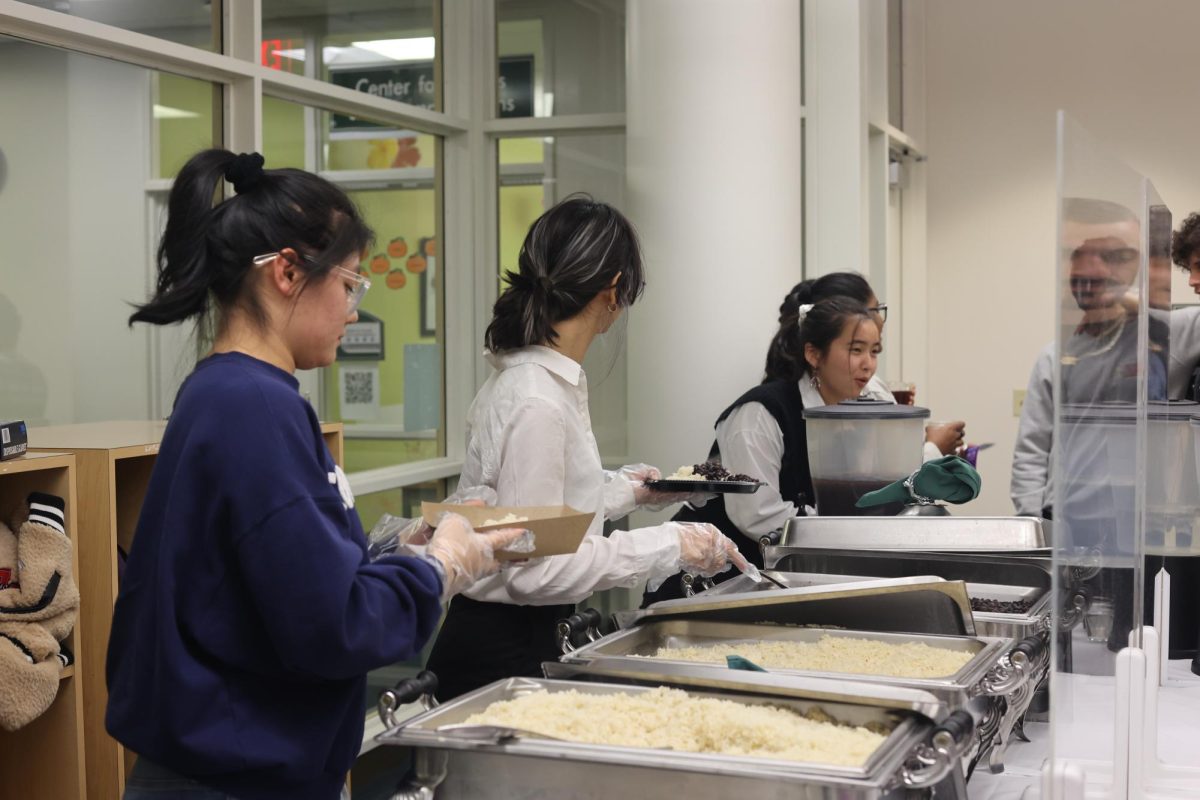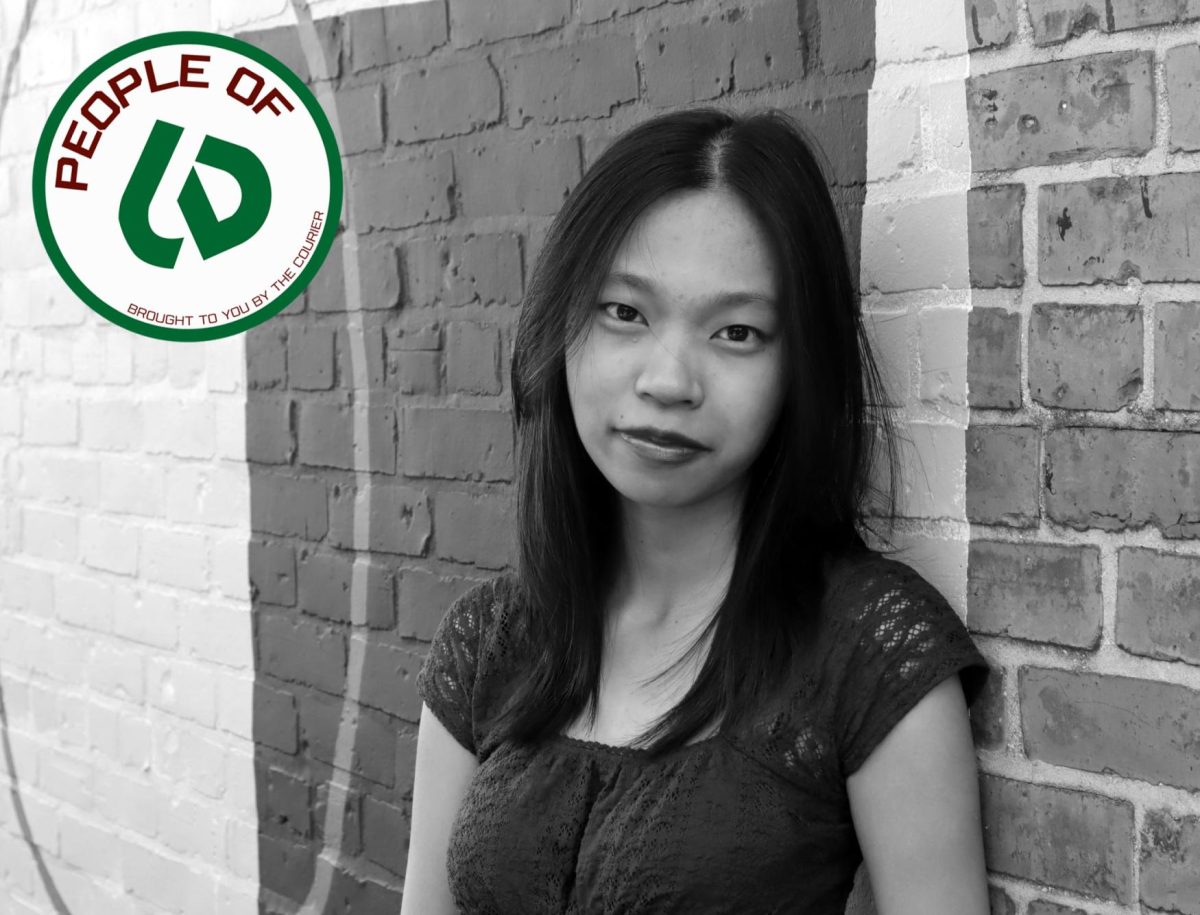Have you ever attended a gathering in which you were purposefully served significantly less food compared to other guests?
This is exactly what occurred at College of DuPage’s Oxfam Hunger Banquet recently with students who participated. It was not done out of deliberate malice, but rather as a way of educating attendees on the current realities of world hunger and food supply allotment.
The banquet was on Nov. 15 and hosted in collaboration with the COD Honors Program and the COD Student Leadership Conference.
Upon entry, each attendee randomly selected a ticket from a basket which assigned them a character from one of three hypothetical groups: the high-income group, the middle-income group, and the low-income group. Each character possessed names, ages and complex backstories loosely based on the circumstances of real-life humans. Every ticket provided instructions on obtaining additional information about one’s character, which involved texting a command prompt to a five-digit number.
For instance, a text message description for a low-income character named Korsaga reads, “You are 28 years old, and you have moved many times to escape the violence from the civil war occurring in the Ivory Coast. You recently moved because your village was being attacked. Right now you feel like you are in a safe haven, even though you lack food and cooking supplies for preparing food. Health is an issue for some people. You are really hoping to see authorities help you and others recover your abandoned plantations.”
Guests were also assigned to one of three seating arrangements depending on the income level of their character: the high-income group was offered a fancy, circular seating arrangement to sit at, adorned with LED candles, black tablecloths, and comfortable, evenly-spaced chairs; the middle-income group were assigned to rectangular tables with chairs close to one another; finally, the low-income group was made to sit on simple blankets that lay atop the room carpet.
Linda Kozlowski, manager of the Fuel Pantry at College of DuPage and guest speaker at the Oxfam Hunger Banquet, believed that the different seating arrangements aided in effectively conveying and simulating the allocation of food worldwide and the injustice involved in it.
“I think my favorite aspect [of the banquet] was having the people segregated,” she said. “That drives home the point when you’re sitting, having a big plate of food served to you, and especially having people sit on the floor, which is very realistic for that level of poverty. But I think that visually displays something that would [otherwise] take a lot of slides to show and to convey.”
These distinct seating arrangements among the different income groups were created to visualize how world hunger is directly correlated with wealth inequality and poverty, and how those living in poorer circumstances are oftentimes not granted the privilege of having secure meals or access to food.
Banquet hosts served guests based on what income group they were assigned to. High-income group members were offered plates filled with generous quantities of crispy rice, freshly cooked kidney beans and sizzling spiced chicken. The group was also provided with utensils and a variety of drinks to choose from, including water, coke and sweet iced tea. Middle-income group members received the same dishes and food, though not as high in quantities. As for the low-income group, all they were given was paper plates of meager amounts of rice with no utensils, as a way of showcasing the harsh injustices those suffering from hunger and poverty endure.
“Hunger is about power,” said Zohaib Quadri, an officer of the Student Leadership Conference, who co-hosted and presented the event. “It’s about unequal access to resources. This level of inequality and mistreatment is generally what drives conflict, poverty, death and— don’t forget— global hunger. No matter whether in rich or poor countries or in urban or rural settlements, hunger affects everyone.”
Quadri shared staggering facts regarding how the COVID-19 pandemic significantly increased poverty worldwide.
“Nearly 1.8 billion people were estimated to be living in poverty, accounting for 23% of the global population,” he said. “This was the estimate before the pandemic. Now that we are out of the fact, those numbers have heightened. Adding another 185 to 223 million people, all of whom live on the equivalent of $3.20 per day.”
As Kozlowski presented after Quadri, she explicitly defined what food insecurity is, and shared shocking statistics regarding hunger in the United States.
“The USDA defines food insecurity as a lack of consistent access to enough food for an active, healthy life,” she said. “The U.S. Department of Agriculture, just two days ago, released a report that said one in seven people in the U.S. are food insecure. And that’s up 30% from the prior year. And I find that shocking. For kids, it’s one in five, and it’s up 40% from the [prior] year.”
Kozlowski also informed attendees on College of DuPage’s Fuel Pantry, what it has to offer, and how it is helping in combating local hunger.
“[The fuel pantry is] open to everyone. It’s an easy one-time registration for your entire lifetime at COD. You just have to register once. We don’t ask for personal information. We don’t ask for financials,” she explained. “We work very hard to destigmatize coming to the pantry. We make it super easy to sign up.
“What motivates me is always increasing awareness, and I think that’s what motivated [the honors program and the SLC] as well,” said Kozlowski. “People and their hearts are good people, but sometimes you need to make them aware of things. This is a reminder to all of us as we go through our drive-throughs and drink our Starbucks, that there’s some people living on a dollar a day, two dollars a day. So I think that was my motivation, just being a speaker, but that was their motivation and doing everything else and organizing this.”
College of DuPage political science student Mishall Khan, who was randomly selected for the low-income group, enjoyed the banquet. She believed it provided thorough insight into world hunger and its causes.
“I gained more awareness thinking about all the people that don’t have [adequate food],” she said. “Just looking at like the cards we got, [those characters are] all real people and these are all real things that happen.”
Khan had intended to attend the banquet as a way of learning more details about world hunger.
“I was curious,” she said. “I understood that they were going to explore different views. I wanted to see what that would look like.”
College of DuPage nursing student Kate Kadag, who was randomly selected for the high-income group, also enjoyed the banquet. Having grown up underprivileged and witnessed food insecurity herself, she felt that the interactive aspect of the event provided an effective example of what food resource distribution is like among different socioeconomic groups.
“At first I felt lucky [being in the high-income group],” she said. “But seeing the treatment with other groups like low and middle income, I really felt bad. Especially because I was also the server, so we gave one spoon of rice to each person in the low-income group. I really felt bad. I could see the food insecurity there.”
College of DuPage reminds students to utilize the Fuel Pantry, which provides food essentials, including organic campus-grown produce, to all students. The Fuel Pantry accepts food donations throughout the year and is currently requesting people to donate more canned meat products as part of their monthly donation theme.








Zohaib Quadri • Nov 21, 2023 at 12:55 pm
Great overall synopsis!